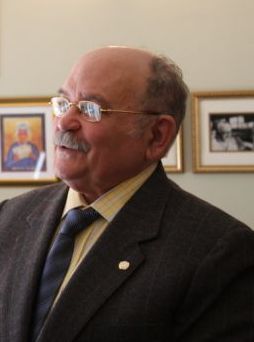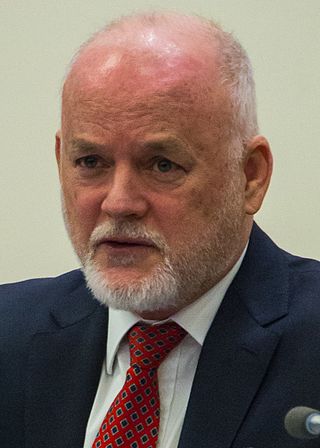
The United Nations General Assembly is one of the six principal organs of the United Nations (UN), serving as its main deliberative, policymaking, and representative organ. Currently in its 78th session, its powers, composition, functions, and procedures are set out in Chapter IV of the United Nations Charter.

The Group of Western European and Other States, also known as the Western European and Other States Group or WEOG, is one of the five United Nations regional groups and is composed of 28 Member States mainly from Western Europe, but also from North America, the Eastern Mediterranean, Fennoscandia and Oceania.

Miguel d’Escoto Brockmann was an American-born Nicaraguan diplomat, politician and Catholic priest of the Maryknoll Missionary Society. As the President of the United Nations General Assembly from September 2008 to September 2009, he presided over the 63rd Session of the United Nations General Assembly. He was also nominated as Libyan Representative to the UN in March 2011. He died on 8 June 2017, having suffered a stroke several months earlier.

The United Nations Regional Groups are the geopolitical regional groups of member states of the United Nations. Originally, the UN member states were unofficially organized into five groups as an informal means of sharing the distribution of posts for General Assembly committees. Now this grouping has taken on a much more expansive and official role. Many UN bodies are allocated on the basis of geographical representation. Top leadership positions, including Secretary-General and President of the General Assembly, are rotated among the regional groups. The groups also coordinate substantive policy and form common fronts for negotiations and bloc voting.

The Group of Eastern European States (EEG) is one of the five United Nations regional groups and is composed of 23 Member States from Eastern, Central and Southern Europe.

Water on the Table is a Canadian documentary film directed, produced and written by filmmaker Liz Marshall. The film explores Canada's relationship to its freshwater resources and features Canadian activist Maude Barlow in her pursuit to protect water from privatization. Counterbalancing Barlow's views are those of policy and economic experts who assert that water is a resource and a commodity like any other.

International Mother Earth Day was established in 2009, by the United Nations General Assembly under Resolution A/RES/63/278. The Resolution was introduced by The Plurinational State of Bolivia and endorsed by over 50 member states. It recognizes that "the Earth and its ecosystems are our home" and that "it is necessary to promote harmony with nature and the Earth." The term Mother Earth is used because it "reflects the interdependence that exists among human beings, other living species and the planet we all inhabit". It is decided to designate April 22 as International Mother Earth Day.

The Sixty-seventh session of the United Nations General Assembly opened on 18 September 2012 and having its last scheduled meeting on 11 September 2013. The President of the United Nations General Assembly was chosen from the EEG with Serbia's then foreign minister Vuk Jeremić beating out Lithuania's Dalius Čekuolis in an election. Notably, the session led to United Nations General Assembly resolution 67/19 which granted Palestine non-member observer state status.

The 70th Session of the United Nations General Assembly opened on 15 September 2015. The President of the United Nations General Assembly was from the Western European and Others Group.

The Seventy-first Session of the United Nations General Assembly opened on 13 September 2016. The President of the United Nations General Assembly is from the Asia-Pacific Group.

The Seventy-second Session of the United Nations General Assembly opened on 12 September 2017. The President of the United Nations General Assembly was from the Eastern European Group.

The Seventy-third session of the United Nations General Assembly was opened on 18 September 2018. The President of the United Nations General Assembly was from the GRULAC group.

The Group of Asia and the Pacific Small Island Developing States is one of the five United Nations regional groups and is composed of 53 Member States from Asia and Oceania.

The Sixty-fifth Session of the United Nations General Assembly was the session of the United Nations General Assembly that ran from 14 September 2010 to 12 September 2011.

The Sixty-fourth session of the United Nations General Assembly was the session of the United Nations General Assembly that ran from 15 September 2009 to 14 September 2010. The President of the session, Ali Abdussalam Treki of Libya, was elected from the Group of African States on 10 June 2009 by acclamation.

The Seventy-fourth session of the United Nations General Assembly was the session of the United Nations General Assembly which was opened on 17 of September 2019 until 16 September 2020.

The General debate of the sixty-third session of the United Nations General Assembly was the first debate of the 63rd Session of the United Nations General Assembly that ran from 23 – 29 September 2008. Leaders from a number of member states addressed the General Assembly.
The 2017 International Court of Justice election took place from 9 to 20 November 2017 at the United Nations Headquarters in New York City. In the set of triennial elections, the General Assembly and the Security Council concurrently elect five judges to the Court for nine-year terms, in this case beginning on 6 February 2018. From the seven candidates, the five winners were Abdulqawi Yusuf (Somalia), Antônio Augusto Cançado Trindade (Brazil), Nawaf Salam (Lebanon), Ronny Abraham (France) and Dalveer Bhandari (India).

The Seventy-fifth session of the United Nations General Assembly was the session of the United Nations General Assembly which ran from 16 September 2020 to 15 September 2021. The President for the session was Volkan Bozkır, who stated that the session's theme was "The future we want, the United Nations we need; reaffirming our collective commitment to multilateralism".

The Seventy-sixth session of the United Nations General Assembly was the session of the United Nations General Assembly which ran from 14 September 2021 to 13 September 2022. The President of the UN General Assembly is from Asia-Pacific Group.















